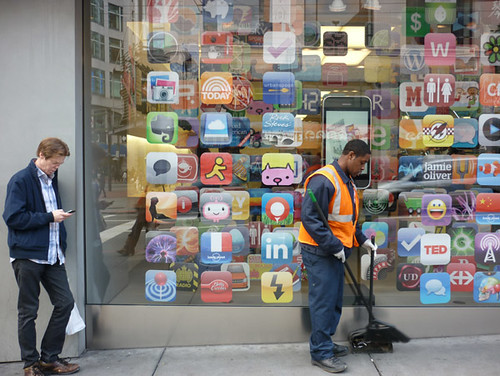Just in time for the unfurling of Google’s mysterious barge, a 50-foot-tall, 250-foot-long shipping container structure that looks to be a sort of floating technology theme park, I thought I’d post some excerpts from a fascinating dialog this summer between several Google employees about their differing worldviews. The full discussion is posted here through the eyes of Kuku Mon, one of the participants who first contacted me after I wrote What’s the Matter with the Google Bus and whom I’ve had several thought-provoking email exchanges with since.
And just as there are those who try to measure happiness with a formula, there are also those who measure progress by the sheer number of years lived.
– Kuku Mon
A couple of notes first:
- I’m using Google as the main protagonist because it’s probably the most visible, powerful and wealthy representative of the Silicon Valley Tech Complex, and also the one most openly claiming to make the world a better place. Just as there are about 40 other companies shuttling their employees from SF to Silicon Valley in exclusive luxury buses, Google is not the only tech company in pursuit of remaking society while turning their founders and executives into gazillionaires. In a way, Google just functions as a symbol for Silicon Valley values that are ever more influential not only in our personal lives but in much broader cultural shifts as well as public policy decisions. My hunch though is that Kuku Mon’s discussion with his colleagues could have taken place at any number of tech companies.
- I’m not anti-technology and not asking to go back to the stone ages (though I suppose Neanderthal bashes by the bonfire were a lot more fun than Google Hangouts or sharing Facebook updates at a meetup), but I find it important to take a critical look at that which we find ourselves engaged in almost non-stop these days and which is reshaping our communication and culture in drastic ways. Sure, humans have used technology since our ancestors first carved their stone chisels, but we’ve come a long way since and our tools are becoming ever more sophisticated in scope and impact on the planet. If we can’t talk about the downsides of our total immersion into the world of screens and gadgets – like having to depend on (mostly fossil-fueled) electricity for almost every little thing we do, enjoying cheap and instant access to (mostly trivial) information on the backs of other people and at the expense of the environment in distant lands, and most of humanity turning into unhealthy couch potatoes, to name just a few – because we’re using technology to do it, then we’re even further along in becoming a pixel-worshipping borg than I thought.

“What you call need, I call suffering.”
Roshi Joan Halifax in response to Zynga Co-Founder Eric Schiermeyer, who insists that people need more information technology in order to further the evolution of human consciousness.
The pivotal question, in my mind, is not so much whether the Googles, Facebooks, and Twitters of the world are providing valuable services, but whether their outsized presence in all aspects of modern life and the speed they are adding to consumption and all trans- and interactions while accruing fantastic wealth for themselves is helping to solve the world’s most pressing problems. You know, the ones that really matter, like poverty, inequality, resource depletion, and climate change.
Moreover, I think it’s fair to ask about the moral fabric of corporate entities with the mission to map every corner of the world, publish every word ever written, and extract every aspect of our personal lives for commercial purposes. Does this global, almost godlike sphere of influence dressed in do-good rhetoric come with a responsibility to engage in deeper philosophical discourse on what kind of society we’re aspiring to be? Whether faster and bigger is always better and whether progress can be measured in algorithms?
I think it does, and that’s why I relished the dialog between Kuku Mon and his colleagues. While most Silicon Valley titans may still be far from a Patagonia level of corporate self-reflection, there seems to be a genuine interest at least among some to look at growth from a more philanthropic angle, beyond IPOs, click rates, and quarterly profits, which I think is what we’ll need to shift towards if we’re serious about sustaining the human adventure on planet Earth into the foreseeable future. Reading A battle of worldviews gave me hope that instead of the world asking Is Google Making Us Stupid? Google might devote more of its energy to the question, “Are we making the world wiser?”
And if we at Google don’t talk about these issues, who else will? The world listens to us. We have a tremendous responsibility to the planet that we exert so much influence on.
– Kuku Mon

Is there an app for that?
The following are some of my favorite excerpts, with Kuku Mon’s commentary in yellow and my responses below…
So is Technology really neutral? Neutral to who? It’s definitely not neutral to nature, which we are an integral part of, no matter how much we’d like to think otherwise by insulating ourselves from it in our air-conditioned offices and cars.
This goes straight to the heart of our isolation from the natural ecosystem we live in.
It turns out that globalization in recent decades caused hundreds of millions of people in the so-called third world to mass-migrate from their original rural communities where they were relatively self-sufficient and well-fed and well-clothed to towns and cities where they started working for someone else and started earning wages.
The classic trick from the colonial playbook: destroy people’s land and ability to be self-sufficient, then graciously offer them “new opportunities” that are slightly more desirable than squalor and starvation but come with huge strings/dependence attached.
At the end of the day, I can picture a person 200 years ago leading a happy life. It’s harder to picture the average human today at about the same level of happiness. Too bad it’s hard to measure happiness so we can’t have the kind of debate we would otherwise have on this mailing list.
True, happiness is hard to measure. However the country of Bhutan has taken a really excellent crack at it with their Gross National Happiness Index.
“We get so much more for our ecological damage now” says a lot of things about one’s worldview. What makes one think “if we don’t waste our resources, someone else will, so why not take the initiative!”? Most of us have struggled with questions related to the extent to which our individual actions might have a positive impact on the world but this line of thinking is a different animal.
Yikes. Hard to believe they would actually think that, but it shines a light on the neoliberal me-first mindset of pretending there are infinite resources, and externalizing true cost to people and planet.
And if we at Google don’t talk about these issues, who else will? The world listens to us. We have a tremendous responsibility to the planet that we exert so much influence on. Let’s not sit back and say we’re carbon neutral. As a company, our operations may be carbon neutral but our impact is anything but. We benefit from the economy because we benefit the economy. And the economic processes of today that cry for incessant growth exert an enormous impact on the planet. We’re right in the middle of it. There’s no escaping the fact that our work here has a direct influence on planetary climate change and other trends converging upon us. I don’t take pleasure in being alarmist. It’s just such a sorry state to talk about.

Happy yet?
I will look at Google as a model of corporate responsibility when they register as a Benefit Corporation. (And I don’t mean B Corp, but Benefit Corp. Will explain below.) All the zero impact claims sound great, but as you point out, they conveniently ignore the much larger footprint Google creates within an economy based on perpetual growth.
Sure, they can make their physical servers carbon neutral, just as they can take a couple thousand cars off Bay Area streets with their commuter shuttles. But your ecological operating system has to be pretty one-dimensional to ignore the fact that your entire modus operandi is to speed things up, including — and this is Google’s bread and butter – people’s consumption. And even just within their own operations, my question in regard to their highly touted reductions in CO2 due to the commuter shuttles still stands: Has anyone at Google ever done an analysis of the type of carbon footprint that comes with the expendable income of employees who can afford a million dollars for a tiny condo? Imagine all the stuff people with a million bucks can and will buy, and the fossil fuels burned to manufacture and ship it.
And just as there are those who try to measure happiness with a formula, there are also those who measure progress by the sheer number of years lived.
Such a brilliant line. Speaks to the fallacy of the western industrial world’s slavish devotion to linear thought.
The B-corp is said to fix this but I haven’t come across much information on it since it was passed into law. The way it’s currently set up, there’s no end goal to capitalism so it’s a runaway train. The executives of a corporation are legally mandated to do everything they can to maximize profits for their shareholders. They are as much caught up in the system as anyone else. Capitalism does work better for some more than for others, at least until it stops working for us all. It’s a story we’ve been told and we’ve been telling ourselves that it’s the best system man can ever come up with.
That’s where the Benefit Corporation comes in. Unlike the B Corporation designation which is a voluntary 3rd party certification, Benefit Corp is a legal entity just like an LLC or a C Corp that redefines the purpose of a company’s existence, requiring consideration of non-financial interests when making decisions and being held legally accountable by third party standards to create a material positive impact on society and the environment. Patagonia was one of the first California corporations to register as Benefit Corp (I reported about it in The Start of a Revolution and Business for Good). Google’s obtuse Don’t be Evil doesn’t quite cut it.
But then it dawned on me that there are indeed alternatives and there are people working on them but they don’t get much publicity or press coverage. I see a lot of conversation going on around non-capitalistic modes of organizing like worker-owned cooperatives. Yes magazine recently ran an entire issue on these topics. Then there are folks like Gar Alperowitz, a professor of political economy, who have certain interesting ideas. And Richard Wolff with his book “Democracy at Work” and other writings on Marxian Economics (oops!(?)). I don’t have an agenda when it comes to proposing solutions. I’d much prefer to critique the current system, for what it’s worth, and help start conversations.
I contributed an article in that issue of Yes and interviewed Gar for How Cooperatives are driving the New Economy. Co-ops are definitely part of the solution.
I love your conclusion and will leave it without further comment, because it’s really powerful. Thanks so much for going the extra mile with these guys and for challenging conventional wisdom and seeking more holistic solutions to the current capitalistic predicament.
I can imagine a time in the near future when Google is a place where most everyone is excited about new possibilities. We’d be well informed and aware. We look forward to discussing the ideas that make sense to us even if they are very different from what we’re used to. We’d look into how the Mondragon Corporation works and study it, take it apart, debate it and critique it. We’d feel no fear in discussing alternative worldviews including those of the indigenous peoples of the world who we seem to have written off ages ago. I see references to the “seventh generation” principle of the Native Americans more and more often these days. We’d be debating history and how it’s been presented to us in schools. We’d ask who writes textbooks and who approves them. There would be a certain energy on all Google campuses worldwide where conversations like these are welcome and commonplace.









I’m finding that one of my most challenging personal issues in this regard is my ability to reject the likes of Google. I’ve achieved more than most. I have a DumbPhone, for instance, and my cable bill is $10/month. But am I willing to accept the dire social consequences of turning off my computer, of remaining twelve steps behind?
And as I consider exactly the topics you raise in this post, I’m forever checking myself when I venture to imagine happiness of 200 years ago, like this dialog, “At the end of the day, I can picture a person 200 years ago leading a happy life. It’s harder to picture the average human today at about the same level of happiness.” It’s unlikely I’ll die from a simple cut; I need not perform hard labor to stay warm; my world is not limited to the places which my feet can take me. There is hardship in every era; we shall not glamorize the past. Still, the sad part about today is that much of our unhappiness is self made.
I see mega companies like Google as backwards Robin Hoods. They rob from the poor (the wordsmith, the photographer, the researcher, the artist), throw the belongings (the writings, photos, knowledge, and creations) to the masses, and redirect all the earnings to themselves. The masses go along with it (free stuff, yah! Why should I pay?).
If that time is near, when the exciting possibilities really could be possible, then companies like Google must break this backward Robin Hood cycle. They must be brave enough to let share their wealth for the benefit all. They must reject domination and give people like the readers of Yes Magazine a reason NOT to reject them. Until then, my happiness lies outside the silicon technology, no formula or measuring ruler necessary.
Thanks for such a thought-provoking post.
What a thoughtful comment, Ruth, thank you so much! I find that the key to navigating through the technology waters is to not look at it as an all or nothing proposition. I think it should be possible to use the positive aspects of information technology, including Google, while at the same time remaining skeptical of the exaggerated status the purveyors of these technologies have attained. There are actually a lot of tech entities that are walking the talk, sharing their knowledge and wealth for the benefit of all. WordPress, the platform upon which I’m typing these words, comes to mind. Also Mozilla, the organization behind the Firefox browser. They’re both non-profit and open source, which to me makes them much less suspect than Google or Facebook.
Ultimately, of course, I think it behooves us all, including Google, that our crisis is not one of slow and inadequate technology, but one a much deeper, non-scientific level. If we can not heal the human spirit, we will not be able to fix all our physical predicaments. There simply is no app for that.